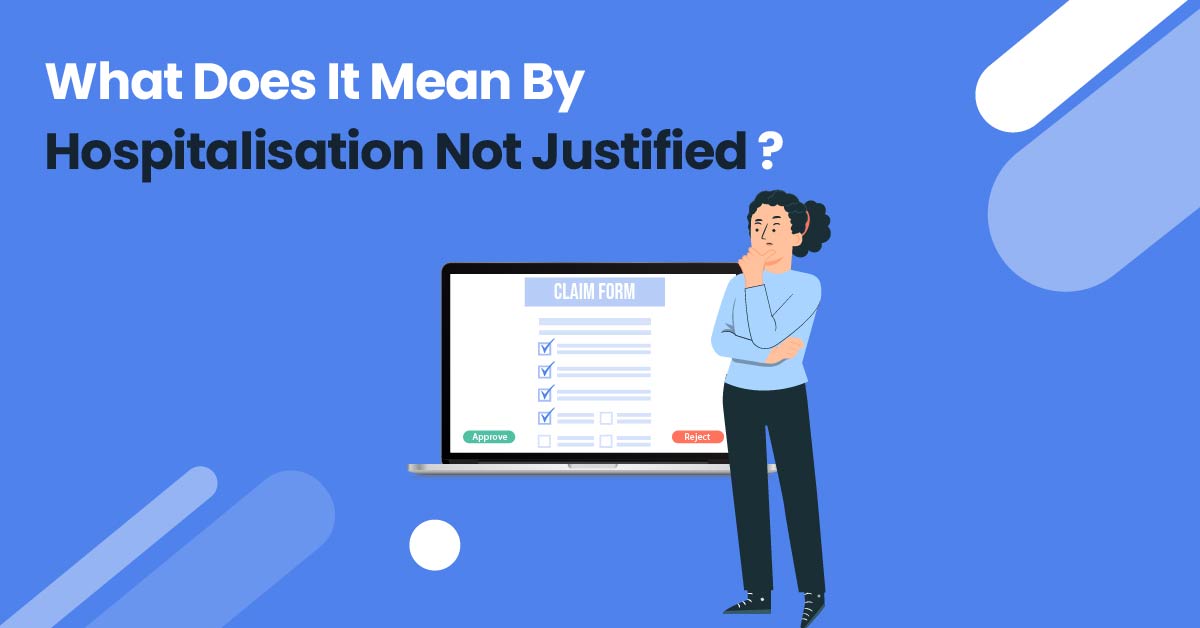
Group health insurance is a popular form of insurance policyAn insurance policy is a legally binding contract between an insurance company (insurer) and an individual or business (policyholder). It More that is often offered by employers to their employees as part of their benefits package. Under group health insurance, a hospitalisation claim can be rejected if it is determined that the hospitalisation was not justified. This means that a patient’s hospitalisation claim can be denied even if they have been admitted for more than 24 hours. In this blog post, we will explore what it means for a hospitalisation claim to be justified or not and the criteria that insurance companies use to make this determination.
What does “hospitalisation not justified” mean?
In simple terms, “hospitalisation not justified” means that the hospitalisation claim is not covered under the insurance policyAn insurance policy is a legally binding contract between an insurance company (insurer) and an individual or business (policyholder). It More. This occurs when the hospitalisation of a patient is not deemed necessary or could have been treated on an outpatient basis. For instance, if a patient is admitted to the hospital due to high fever and only oral treatment is provided without IV and antibiotics, the insurance company can deny the claim as the treatment could have been provided on an outpatient basis.
Criteria for “hospitalisation not justified”
There are a few criteria under which the hospitalisation claim is not justified even after getting admitted for more than 24 hours,
- Hospitalisation only for observation: If a patient is admitted to the hospital only for observation and no active line of treatment is given, the claim cannot be paid. In this case, the hospitalisation should be justified, and the reason why the patient cannot be managed on an outpatient basis should be clear.
- Hospitalisation for conservative investigation: If a patient is admitted to the hospital for conservative investigation and no active line of treatment is followed, the claim can be rejected. According to the policyAn insurance policy is a legally binding contract between an insurance company (insurer) and an individual or business (policyholder). It More, hospitalisation should have a proper active line of treatment, and positive investigation reports supporting the diagnosis should be provided.
- Hospitalisation for oral medication: If a patient is admitted to the hospital, and only tablets and syrups are given without any active line of treatment, this will not be covered under the insurance. If the patient requires medication, it has to be given in writing by the doctor, and the reason for the particular mode of treatment for the patient should be included. If this does not justify the hospitalisation of the patient, the claim won’t be processed further.
What documents are required for a “hospitalisation justified” claim?
To make a “hospitalisation justified” claim, certain documents are required.
- The most important of these documents are the Indoor Case Papers (ICP). These papers explain the vitality of the patient during hospitalisation and the treatment given during that period. The ICP papers include treatment charts, which mention the medicines, injections, tablets, IV, IM used, along with the number of doses given per day and the time record of the patient. Vital charts include the patient’s vitality per day, with a time-temperature record, pulse rate, BP, respiratory rate, and all other medical observations required during hospitalisation.
- Discharge summaries are also mandatory as they justify the treatment. If the documents do not justify the reason for hospitalisation, then the insurance company or the Third-Party Administrator (TPA) can ask for the indoor case papers.
Where can I get the ICP papers?
The hospital maintains the ICP papers for their internal records, and they can be shared with the insurance company or TPA if required. The hospital will not provide the original ICP paper; they will only provide the scanned photocopied document.
In conclusion, group health insurance policies can be a great way to ensure that you are covered in case of hospitalisation.
